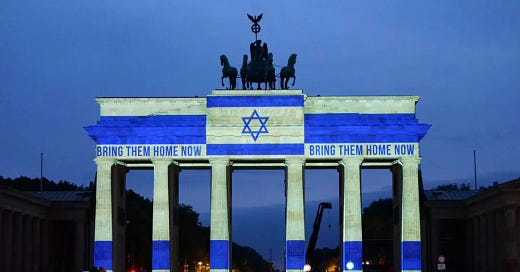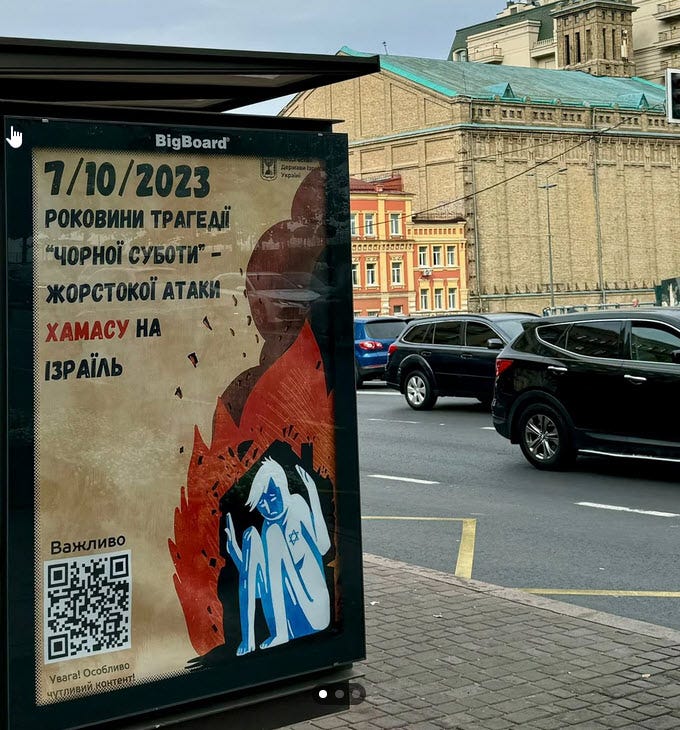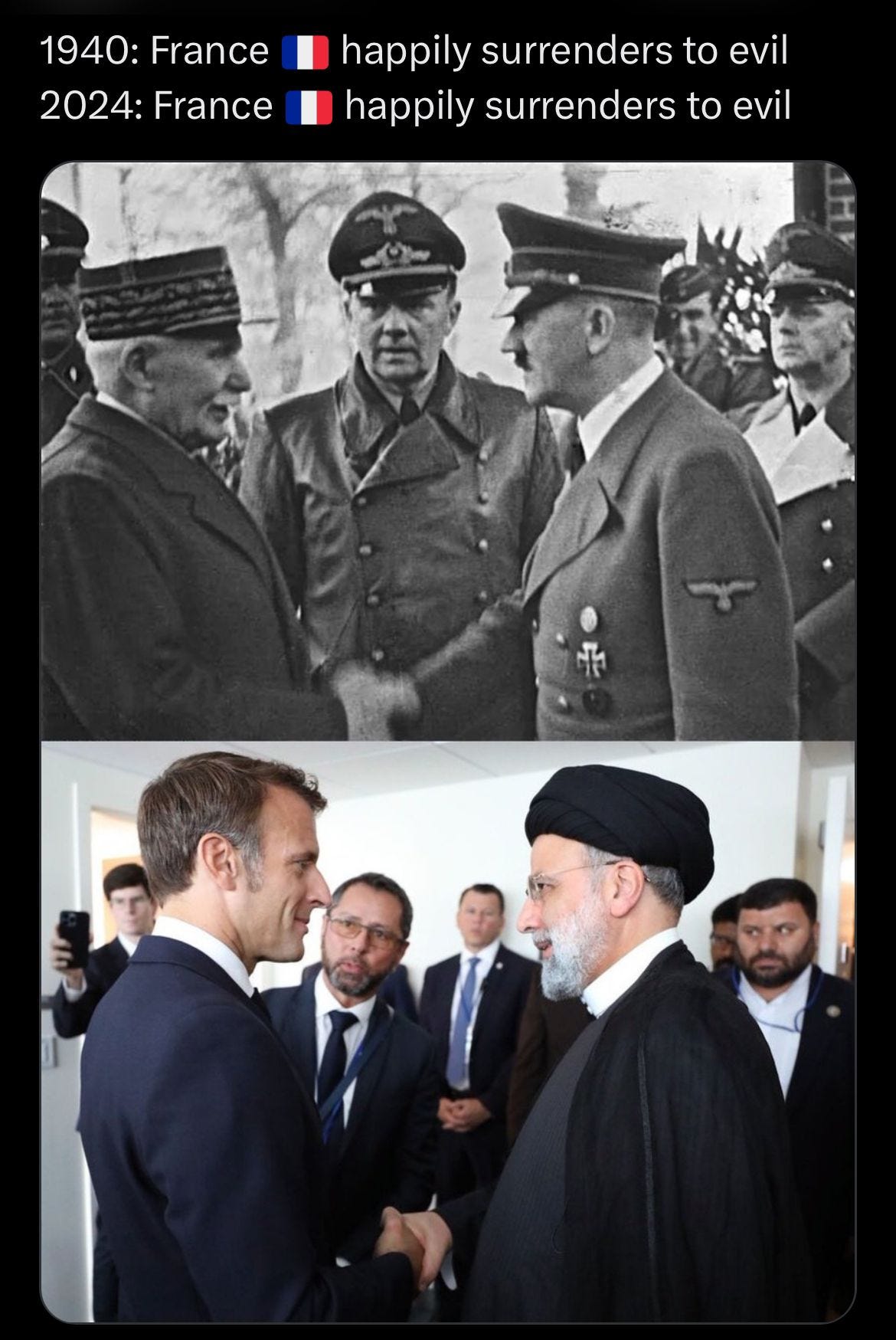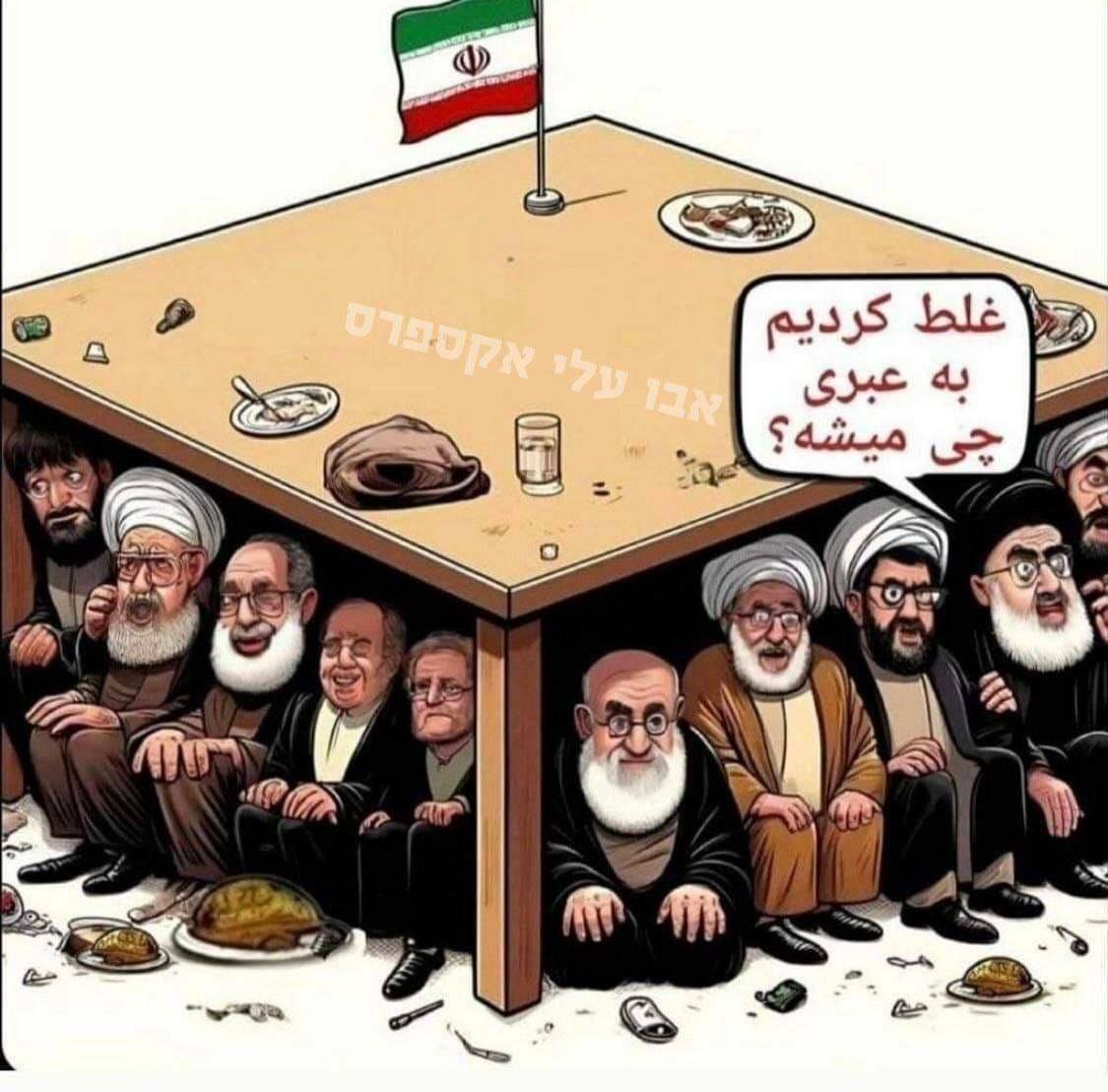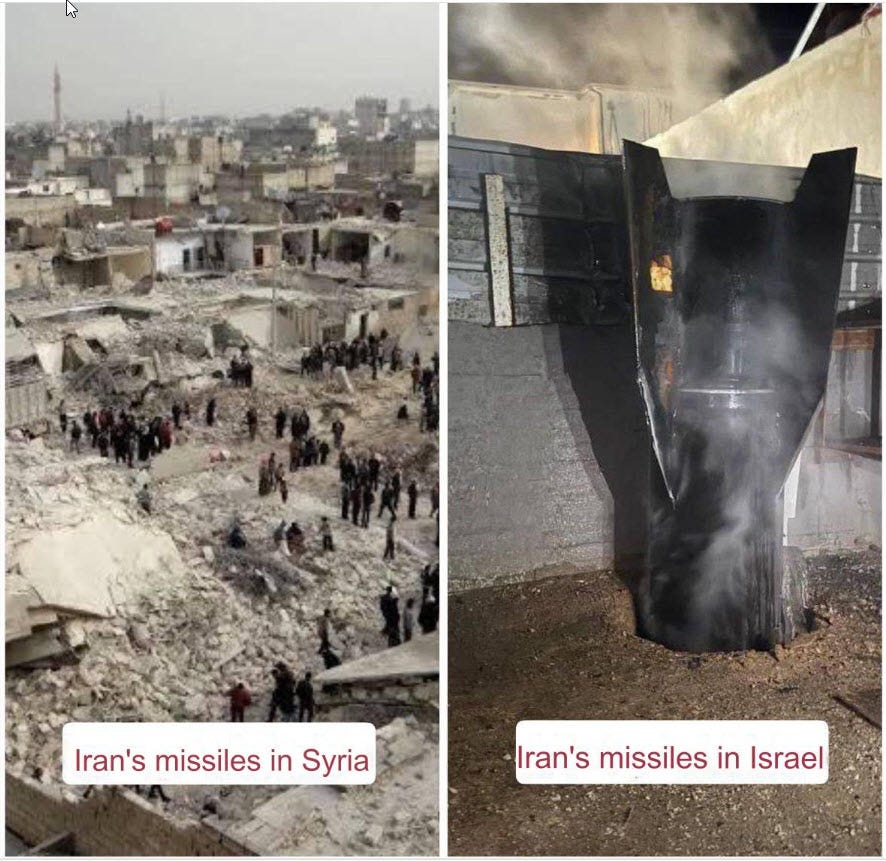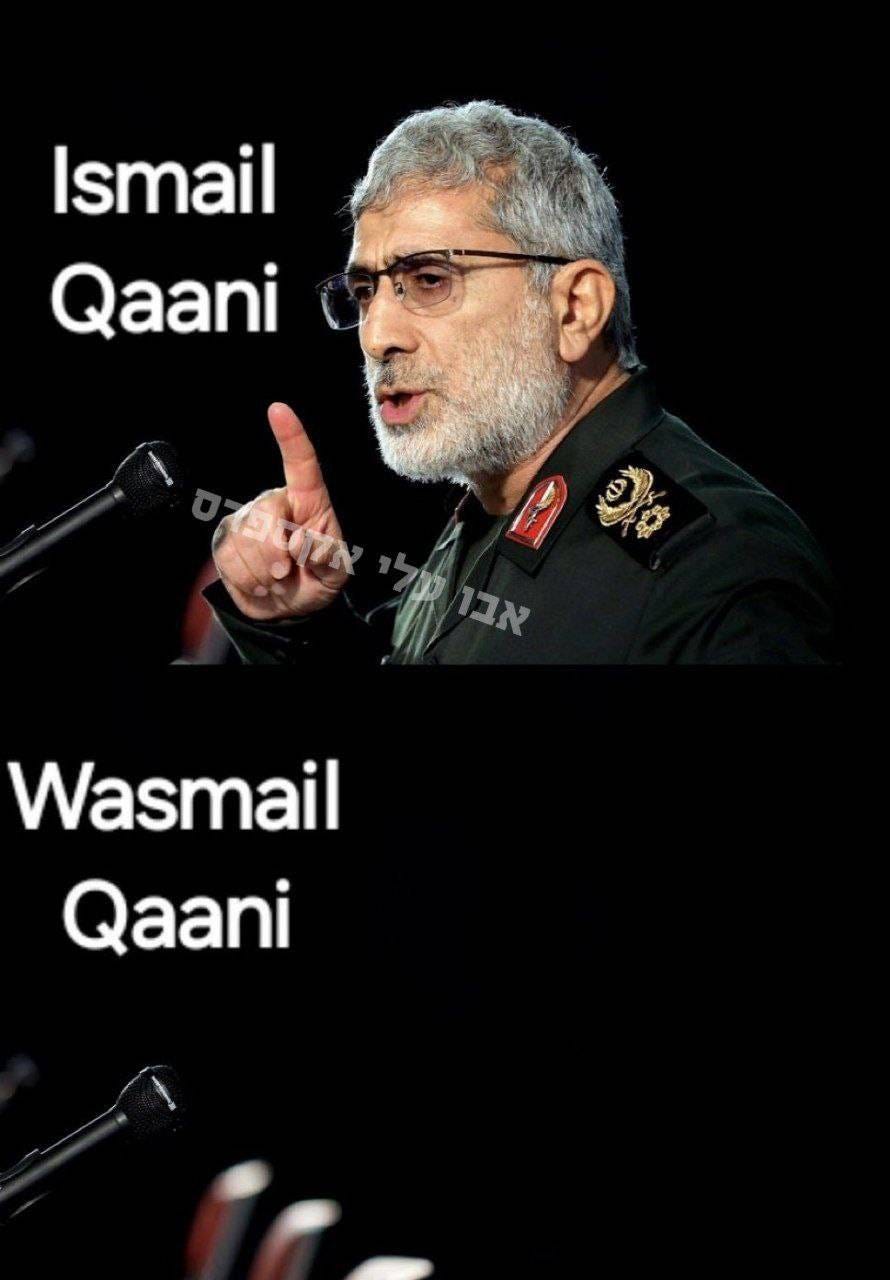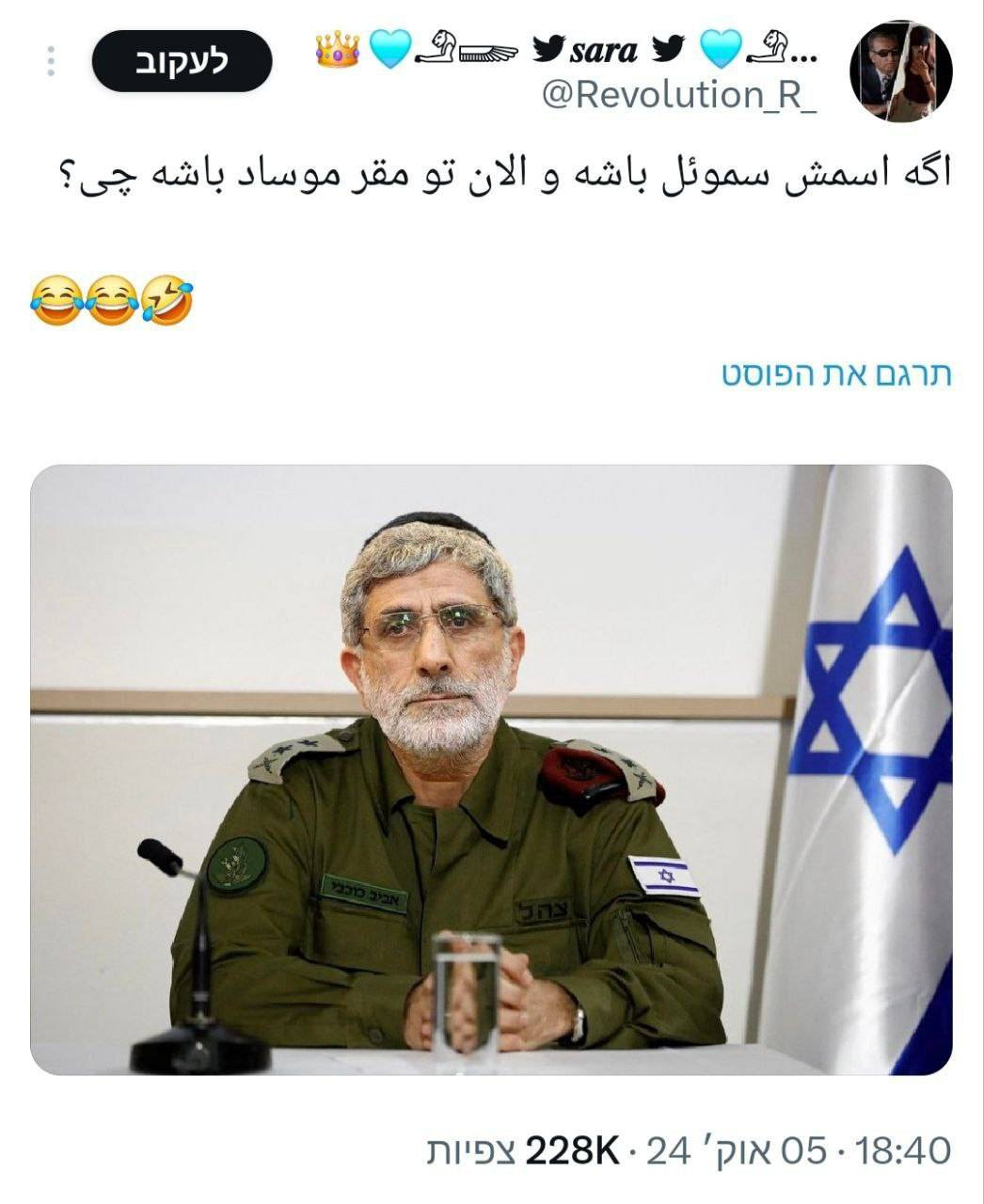First Time Here? Readers suggest starting with the expanded Gaza Explainer in #133 and #120.
Tags: 20 Min Read (mostly excerpts); Humor; Lots of Video Clips
If You Read One Thing: See Thomas Friedman, below.
Today is October 8.
I launched this blog a year ago. My sister said, "You already have that substack. Use it so I can tell people to look there."
I told my kids: Wars here are brief. Even three weeks is long. It will be over soon.
Now I have a friend whose son, a reservist, volunteered for so much combat duty that by law he cannot be called up again for life (outside a national emergency).
I imagine that if we did the math of total "combat days" (one soldier in combat conditions for one day), that Israel has "spent" more combat days in the last year than in its entire history. All the wars combined.
Perhaps a bureaucrat at the Ministry of Defense has that spreadsheet?
Mail
Any thoughts on getting out or you staying put? You good or what?
And:
I’ve been thinking about you and hoping that you are staying safe. The world has been a scary place, and Israel right in the middle of it all
How are you doing and do you feel safe?
I want to engage this directly, because it comes up regularly (and the people who ask care).
The topic of safety exists on three levels for me:
Acts of terrorism (killings "on the street")
The post October 7 sense of reality (which includes the understanding that the Israeli military can royally fail and months of rockets shot from Gaza, Lebanon, and Yemen towards the city in which I live [Tel Aviv])
Missile attacks from Iran
To be clear, people in other parts of Israel feel different things (for example in the north where Hezbollah has been rocketing and blowing up Israeli houses for a year now). Those with immediate family members in the army are at their own level (I was at a Rosh Hashana meal with a neighbor whose son is in Lebanon right now.) So my level is my level. Not representative of anything other than Raf.
#3 is the one that gets under my skin the most. I know I will have ample warning to get to a safe space, and--so far--#3 has caused the lowest casualties--by far-- compared to #1 and #2, but it is the one that causes me the most stress.
Bottom line: It’s me. Last Tuesday, October 1, when the most recent Iranian attack came, I was not responsible. I had seen the “shelter in place” directive, but then got a suggestion to come to Jerusalem right away (instead of the next day). Rather than staying put (with easy access to a secure room), I ended up being on the train when the missiles came. The train stayed at the Ben Gurion airport station for 30 or 40 minutes. The station itself is below ground. I spent some of the time in the station's shelter.
Not the smartest move. I should have stayed put.
My phone on October 1:
#2 is different. There is a strong sense that the wars in Gaza and Lebanon are just, defensive wars. Across the Israeli spectrum, these battles are unwanted yet necessary. For the first half year, vis-a-vis Gaza, there were many calls to change the method of prosecution (how the war was being waged), but not for the need to take action. As we all see, Israel was ready for a war in Lebanon and not for one in Gaza.
#1 is what most people thought when I voiced my intent to be here. Since October 7, there have been a handful of attacks against civilians--and dozens of stabbings of uniformed soldiers. A recent shooting attack was not far from my apartment (1-2 miles away). How to think of such horrific events?
The U.S. has about two mass shootings per day (630-680/year in the past few years). The numbers are something like: The U.S. has more mass shootings than the next 15 countries combined. This is not an abstraction to me, a Seattleite for 25 years: In addition to the 2006 shooting at the Seattle Jewish Federation, I directly heard a big burst of gunfire in a park near my then-house in Seattle (no one was hurt) and a neighbor who was threatened with a gun by a guy stealing our mail.
My point: I don't compare the level of “street” terrorism in Israel to "zero" because in the U.S., it isn't zero. If absence of street violence were a priority for me, maybe I'd move to Portugal or a Greek island? I don't know. The bottom line is that I don't know how to compare the very real, intermittent, street violence in Israel versus the also very real street violence in Seattle and the U.S.
Violence in Seattle did not make me think of "moving out of the way." Should terrorism in or near Tel Aviv? (My brother in law, who lives just a kilometer from where I lived in Seattle, frequently hears gunshots from his living room.)
Nasrallah's Death & It's Implications
I find it astonishing that the entire regular media here in the US have completely failed to discuss the implications of Nasrallah's death for Lebanon, Syria and other states, or the euphoria in so many places. They talk about the deep mourning in Lebanon, don't mention Syria at all. Frankly, it's journalistic malpractice. [S.D.]
The Middle East isn’t “compatible” with American media. Long form journalism can barely engage life here. "Regular" media, outside a few deeply qualified observers (one of whom is cited below), doesn't have a chance and, to my eyes, makes the problem worse (as I have mentioned before).
In #142 I discussed the symbolism of the assassination of Nasrallah. The politics of Lebanon are too messy for me to engage here, but the bottom line is:
Lebanon, Yemen and Syria are failed states
Iran, a poor, struggling state, spends hundreds of millions creating, supporting and arming violent, jihadist groups in these countries
Hezbollah is the Iran-funded group in Lebanon
Iran arms these groups with the biggest and best weapons they have. (Found by soldiers on the ground then destroyed by the Israeli air force..)
Lebanon and Syria have intense hatred between their ethno/religious segments
The Lebanese political system is weak, and is hobbled primarily because Hezbollah holds a substantial minority in the government
This minority position has been used to block appointment of a new president of Lebanon for two years now
This minority position is also used to enable patronage and corruption
A small story
An Israeli friend of mine had a Lebanese business partner for years. They provided IT related services in Africa and the Persian Gulf. His partner was a Lebanese Christian.
One day, this Lebanese Christian said: That's it. I can never go back to Lebanon.
Why?
Because he had sold his family's village to a Shia family. A treasonous act. His extended family would kill him for this.
And Another
During the 1982 Lebanon War, something that took Israel by surprise was the violent internecine hatred. Druze, Christians and Muslims butchering each other, and each with their own militia. I heard Israeli soldiers recount villages massacring the elders of the next village over. To say nothing of the Sabra and Shatila massacre.
Hezbollah has no agenda for Lebanon's future other than a strong preference to impose Islam and Sharia on Lebanese society. They are open about their values. One can imagine that much of Lebanon holds them in contempt.
About Those Genies...
(Referring to claims on Iranian TV that Israel uses Genies for intelligence gathering in #143) [Israel] doesn't have genies, we have geniuses (who were on vacation on 10/7, but have been on the ball in Lebanon).
This Is It?
The issue of Haaretz in front of me says "Regional War."
Well, let's see....
Africa has been consumed by conflicts for many years now. The Tr*mp administration began a multi-year disengagement from most of those conflicts while Russia ramped up its involvement.
Europe is in the middle of a war hybrid and hot. A recent installment in the hybrid department: A megabomb, in the form of a cargo ship loaded, by Russia, with 20,000 tons of explosive ammonium nitrate--seven times more than blew up in Beirut in 2020, is trying to dock in England. Beyond that, Russia is committing acts of sabotage across Europe (torching weapons factories, cutting cables to take German rail lines out of service, targeting Russian emigres and much more. (I haven’t heard of anyone cancelling travel to Europe as a result.)
The Middle East is in "phase n" of war, with Russia and America involved directly and via proxy in every aspect.
In other words...
This Is WW-III
What would a historian call it, ten or twenty years from now?
In the 1970's and 80s, the "big worry" was missiles flying between the USSR and the USA.
Today: Russia and Ukraine exchange strikes of every kind, for coming on three years. The U.S. and every country of Europe are involved in every way except boots on the ground.
Iran and Israel have been fighting a cold war for years. Now it is hot.
The vast majority of the bloodshed has been in Ukraine and Russia (in Europe) and in Syria and Yemen (in the Middle East). (Casualties in Gaza—tragic as they are—being an order of magnitude less than other Middle East conflicts of the past twelve years.)
There is more than one perspective, one story and one truth at work. So here is today's "survey of stories."
Hezbollah, Nasrallah and Posturing
(This is by Abu Ali Express, a right wing warmonger. I can't fault his words.)
Above: The Al-Manshiyah neighborhood in Burj al-Barajneh, in the Dahieh district of Beirut.
Every time I [the man behind the Abu Ali alias] see the destruction in Dahieh after all the airstrikes there, I remember all the threats in Nasrallah’s speeches over the years about what would happen if Israel dared to attack even once in Lebanon. Threats that shook Israeli leaders and prevented them from attacking any [of Hezbollah’s weapons] in Lebanon. Instead of attacking, Israel organized “media exposures” with maps of Hezbollah’s weapon storage centers in Dahieh. There was a great fear of attacking. Even in the first ten months of the war, there was a great fear of attacking in Dahieh.
And now… it’s as if they are attacking a training area in the Negev. Without limitation and without threat to the aircraft. [Because Hezbollah's limited anti aircraft systems were destroyed some time ago. The IDF has been attacking Dahieh every night since the elimination of Nasrallah, including as I type these words. —R.Z.]
It takes time to sink in. This is the wonderful new reality.
Nasrallah orchestrated one of the best psychological-warfare operations seen here in recent decades. Let’s hope we all learned the lesson.
Until a few weeks ago, Hezbollah's enormous arsenal threatened and controlled, essentially, the entire Middle East. Hezbollah helped Asad put down the rebels in Syria's civil war; Controlled the Mediterranean off Lebanon's coast (greatly restricting the Israeli Navy with powerful Iranian-supplied anti-ship missiles); and threatened natural gas platforms in the Mediterranean.
Hezbollah, as mentioned, does not exist to improve the life of a single person. They are an offensive army and only an offensive army.
Cap Hezbollah's huge arsenal with fifteen years of Nasrallah’s unvarnished threats and chest beating and it is true: The region is suddenly changed. Hezbollah's headquarters in Beirut are smashed. Much of their armament is destroyed. They are unable to defend a square meter anywhere in Lebanon. (This is psychologically important because their message to the Lebanese, for many years, was that they were the “defender of Lebanon.”)
Wow.
October 7: The Anniversary in the Eyes of a Warmonger
Abu Ali Express again:
October 7th, 2024
מבירא עמיקתא לאיגרא רמא
Mebira amikata leigra ramaFrom a deep ditch to a tall roof
Just as on 10/6/23 you could not imagine that what was going to unfold in a few hours was even possible, so too I am convinced that there is no one in Israel who thought on 10/7/23 that this would be where Israel stands on 10/7/24.
In the first month of the war, I received countless e-mails from people who seriously feared that this was the end of the State of Israel. After the terrible blow we received from Hamas in the south, there was a strong fear that Hezbollah would join the campaign and Iran would finish the job.
The Iranian axis seemed very threatening and the Israeli army seemed incapable of the task.
And here we are, on 10/7/24. Hamas's military capabilities are almost eliminated, Hezbollah took unprecedented blows that left us all speechless, and Iran lifted us up for landing, at the ultimate point of time, from Israel's point of view, to eliminate the Iranian threat. [By launching missles at Israel and U.S. bases, inviting a strong response.]
The Iranian axis is disintegrating link by link and Iran stands naked. The master plan of Qassem Soleimani, commander of the legendary Quds force, is collapsing. He wanted to keep the war away from Iran and manage it through the many (and powerful) proxies of the Axis. Now, the house of cards is collapsing and the fire threatens to take hold of the Ayatollahs' mantle, right on their doorstep. Very far from the original plan.
I will allow myself to say a sentence that may not be comfortable for everyone, but from a historical perspective, from a bird's eye view, the events of October 7th strengthened the position of the State of Isrsel for decades to come.
Think for a moment what would have happened if the events had arrived two years later:
Hamas would have strengthened militarily, Hezbollah would have continued to grow stronger and Iran would have obtained a nuclear bomb. Israel would have remained stuck in its conception, without any legitimacy in the international community to act to thwart the growing threat. Hamas and Hezbollah would have breached the borders in a coordinated manner with Iran overhead with a nuclear threat.
The results would be terrible beyond imagination. This was avoided.Just as the Holocaust was a significant driving factor in the establishment of the State of Israel, so too were the events of October 7th in ensuring Israel's security for decades to come. We didn't choose it but that's what happened.
It may sound like a cliché, but the heroes who gave their lives on October 7th and in the year that has passed since then are the silver platter on which the State of Israel was reborn.
Israel is now at the highest point it has been in recent decades in terms of power relations vis-à-vis its enemies in the Middle East. Both in terms of deterrence and in terms of de facto superiority on the battlefield. Israel competes in 7 arenas, almost alone, and it can handle them. It is true that it takes time. It is true that there is more work. It is true that there are still difficult days ahead of us, but we have the upper hand now and it is getting better and better as time passes.
Long-suffering works in our favor. Our enemies, who boasted of their "firm stand" and did not believe we had the same steadfastness, discover to their surprise that they were wrong. Time amplifies the current Israeli achievement and establishes it. We will enjoy the fruits for decades to come.At the same time, it is important to remember on this day that time does not play in favor of our brothers and sisters kidnapped by Hamas - our open and bleeding wound. A wound that prevents us from being whole.
We will remember the many hostages on this day and wish for their return soon. We will remember our dead, our wounded, their families. It is important that we remember how much we owe them. Forever.
And we will remember to win. Thanks to them and for them.
Because we have no other choice.
Together we are already winning.From a deep ditch to a tall roof. In one year.
Additional perspective: The north of Israel continues to be under near constant bombardment by rockets and drones from Hezbollah and Iraq, and around 75,000 people are still exiled from their homes as a result. Just look at the history of Red Alerts (they are air raid sirens to those on the ground).
On October 8, Abu Ali continues his thought:
Today the following three main events happened:
1. Naim Qassem, Nasrallah's deputy, asked for a ceasefire in front of the whole world.
2. The Israeli Prime Minister announces the elimination of Nasrallah's successor and calls on the Lebanese people to rise up against Hezbollah, because there is an opportunity now.
3. IDF soldiers stuck the Israeli flag in the Lebanese soil where the statue of Qassem Soleimani, the mastermind of the Iranian stranglehold on Israel's borders, was previously placed next to the Palestinian flag. Here are the videos:
Before:After:
Do you see where the vector leads?
The general direction is very clear and very positive from Israel's point of view.
Strategic and historical processes are unfolding before our eyes, thanks to Israel's firm stand, thanks to the military power that Israel has exercised over time. The effect is cumulative. History is being written.
OK, enough of this singular, militaristic lens. He isn’t wrong (in these entries). Just so incomplete as to, perhaps, miss the forest for the trees.
Thomas Friedman: What I’m Thinking About on the First Anniversary of the War
In the New York Times, Thomas Friedman wrote a thoughtful essay. (PDF here.) The words of Abu Ali, above, seem to Raf as “the truth from the chair of a general.” Most of us don’t sit in such an office. A few excerpts from Mr. Friedman's essay (emphasis Raf’s):
So what am I thinking about on this first anniversary of the Hamas-Hezbollah-Iran-Israel war? Something my strategy teacher, Prof. John Arquilla of the U.S. Naval Postgraduate School, taught me: All wars come down to two basic questions: Who wins the battle on the ground? And who wins the battle of the story? And what I am thinking about today is how, even after a year of warfare, in which Hamas and Hezbollah and Israel have inflicted terrible pain on one another’s forces and civilians, no one has decisively won the battle on the ground or the battle for the story. Indeed, one year after Oct. 7, this is still the first Arab-Israeli war without a name and without a clear victor — because neither side has a clear win or a clean story.
We can and should sympathize with Palestinian statelessness and Arabs in the West Bank living under the duress of Israeli settlements and restrictions, but to my mind, there is nothing that can justify what Hamas attackers did on Oct. 7 — murdering, maiming, kidnapping and sexually abusing any Israeli they could get their hands on, without any goal, any story, other than to destroy the Jewish state. If you believe, as I do, that the only solution is two states for two indigenous peoples between the Jordan River and the Mediterranean Sea, the Hamas rampage set that back immeasurably.
...
But the lack of a good story is hurting Israel in other ways. Israelis are being asked to send their sons and daughters to fight every day against Hamas and Hezbollah foes — yet cannot be sure if they are going to war to save the state of Israel or the political career of their prime minister.
...
And it is disastrous in another way that is not so obvious. Israel has just delivered a devastating blow to Hezbollah’s leadership. As a purely military operation — combining high tech, intelligence and precision strikes by the Israeli Air Force — it will be studied by armies all over the world. But here’s the rub: I can assure you that most of the Israeli pilots, spies and technologists who produced that operation were the same Israeli street protesters and leaders of the opposition to the judicial coup that Netanyahu attempted in the year before the Hamas invasion — a coup attempt that split the country and encouraged Hamas’s invasion and Hezbollah’s pile-on, as Netanyahu was warned before the war.A few months before Oct. 7, I was invited to do a Zoom meeting with hundreds of Israeli fighter pilots, who were grateful for my opposition to the judicial coup. One asked me straight up whether he should stay in Israel or leave. I told him that I could not answer that, but it was such a reminder to me how much, in war, a country’s story matters.
No one has taught me more about the tension between those pilots’ stories and Bibi’s story — and its implications for Israel’s fate — than Dan Ben-David, a Tel Aviv University economist who heads the Shoresh Institution for Socioeconomic Research. I wrote to him to ask what he was thinking about the Oct. 7 anniversary. This is what he emailed back:
“My mom was a 13-year-old smuggled alone out of Baghdad to Palestine during World War II. My father landed here as an orphan; his father was butchered by his Lithuanian neighbors as the Nazis moved in. Following the war of independence, my parent’s army units joined to create Kibbutz Malkiya on the Lebanese border. (That kibbutz, where they first met and married, became a charred ghost town over the past year [due to constant rocketing by Hezbollah].) That’s my family’s history — but change the names, and you basically have the history of Israel 1.0.”
...
So on this first anniversary of the Oct. 7 attack, I find myself most preoccupied with the fact that Israel is fighting a multifront war and Israelis still don’t know whether they are fighting to make Israel safe for a Jewish democracy or safe for the prime minister’s political survival, safe for the ultra-Orthodox to never have to serve in the military and safe for the prime minister to declare to the world he is defending the frontier of freedom in Gaza and Lebanon while sustaining a morally rotten and economically draining settlement engine in the West Bank.The biggest threat to Israel today is not Iran, Hamas, Hezbollah or the Houthis. A united Israel can beat them all. It is those who are unraveling Israel’s steel thread — with a bad story.
I should add that I disagree with Mr. Friedman on the question “neither side has a clear win.” Hezbollah wins if it is able to regroup and rebuild (they don’t care if their project takes a year or a century). Ditto Hamas. Ditto Iran. Mr. Friedman is right about Israel, however: It’s leadership has not defined winning because it can’t. Normal leadership would say: We insist on alternative leadership for the Palestinian territories that is committed to Israel’s security. But it was Bibi himself who funded Hamas in Gaza! And Bibi who, for many years, preferred Hamas to that “other” entity [the PA-Palestinian Authority] that has committed to Israel’s security.
So Mr. Friedman is right: Israel does not have a clear win, due to the choices of its Prime Minister. But about Israel’s opponents, Mr. Friedman, I suggest, is wrong. They have clear wins. All they have to do is survive to fight another day.
Postmark
Gaza & Iraq
Hebrew and Arabic with English Subs (2 min)
IDF: After more than a decade in captivity in Gaza: the IDF led by COGAT [Israeli bureaucracy that administers areas not part of the Israeli state, like Gaza], in collaboration with the U.S. Embassy in Israel, rescued a young Yazidi woman held by a Hamas terrorist affiliated with ISIS in the Gaza Strip
In an operation coordinated by IDF and led by COGAT, with the U.S. Embassy in Israel and other international actors, Fawzia Amin Sido; a 21-year-old woman of Yazidi origin was freed this week from captivity and returned home to Iraq. About a decade ago, when she was only 11 years old, ISIS terrorists trafficked her to a Hamas terrorist affiliated with ISIS in the Gaza Strip where she was held in captivity.
During the "Swords of Iron" war, the terrorist who held her was killed, presumably during IDF strikes in the Gaza Strip, and she fled to a hideout within the Gaza Strip. In a complex operation coordinated between Israel, the United States, and other international actors, she was recently rescued in a secret mission from the Gaza Strip through the Kerem Shalom Crossing. Upon her entry into Israel, she continued to Jordan through the Allenby Bridge Crossing and from there- returned to her family in Iraq.
This is further evidence of the connection between the terrorist organization Hamas and ISIS, as well as additional proof of the crimes against humanity committed by the murderous terrorist organization in the Gaza Strip. The IDF will continue to act to dismantle the Hamas-ISIS terrorist organization, strike terror infrastructure sites, and free all hostages in Hamas captivity.
Southern Lebanon
One of the many Hezbollah arms caches found by the IDF in recent days.
The weapons, hidden in civilian buildings in villages near the border, were taken into Israeli territory.
And here is a Hezbollah attack tunnel:
IDF spokesman: IDF soldiers sealed a 250-meter-long Hezbollah attack tunnel 300 meters from the border with Israel with concrete.
Beirut: Dahieh, Hezbollah's Stronghold
St. Theresa area in Dahieh. Note the many secondary explosions at the site that was attacked - showing the presence of weapons at the location.
Tehran
A billboard in Tehran on October 5:
"You will cry a lot" in Hebrew.
A regime that posts billboards in a language unknown to their citizens….
Isfahan, Iran: October 1
Iranian sources associated with the opposition: at least 5 failed Iranian launches failed during launch and fell in the area of Isfahan, Iran.
Below is another failed Iranian launch in the Fars district of Iran:
Isfahan, Iran: October 7
What Happened in the Skies Over Isfahan Last Night?
Iranian sources reported late last night about the sounds of explosions in the skies over Isfahan (reminder: the Natanz nuclear facility is located in Isfahan province). Initially, it was thought to be an attack, but later, sources from the Iranian regime denied any explosion had occurred, and the story kept evolving.
This morning, the Iranian news agency Fars reported that a "foreign and luminous object" was seen in the skies over Isfahan, and the sounds of explosions were due to attempts by Iranian air defense systems to intercept it.
A commentator snarks:
Maybe UFOs decided to test Iran's air defense capabilities. Maybe it was a stork with a glow stick...
Or maybe it's just Iranian paranoia.
Anything is possible these days.
Negev
In the Negev there are those who were pleased with the fall of the Iranian missiles close to their place of residence.
The narrator in the video:
”A kilo of red copper is worth 25 NIS (about US$6.60). The missile weighs 200 kilos, which means 5,000 NIS (about US$1,318) landed (for us) from the sky...”
And off to market it goes...
Al Jazeera
First there was revocation of Al Jazeera's press status in Israel. Now the Palestinian Authority has done something similar. You don’t say? Could it be because Al Jazeera promotes a pro-Hamas message and many of its journalists are Hamas members—even combatants—on the side?
Hezbollah Social Media
Has stopped announcing deaths. Of junior and even most senior casualties. The hiccup started on September 23 and got much worse the following week.
For those who troll social media, deaths can still be tracked (Hezbollah members are buried in the Hezbollah flag).
Syria: Homs
Syria: Explosions in the ammunition depots in Homs following the reports of the Israeli attack.
Syrian sources report that Syrian army ammunition depots were attacked.
Tel Aviv
The dog is looking for a "co-owner" to share responsibility and help with the dog's recovery. (Ever hear of “co-owning” a dog? I heard of it in Seattle. Also, in Israel, co-parenting kids, among unmarried adults.)
Berlin, October 7, 2024
Kiev
October 7, 2023
Anniversary of the tragic "Black Sabbath." The cruel Hamas attack on Israel.
Relief Area
Alef: About Macron's Call To Embargo Arms
(Raf’s understanding is that Macron’s words are empty because France provides no arms to Israel.)
Bet: A cartoon of the Iranian opposition:
The heads of the Ayatollah’s regime hide under the table and ask:
How do you say "we made a mistake" in Hebrew?
Gimmel: Another cartoon by the Iranian opposition
Compare the Iranian missile attack to the pager attack attributed to Israel:
An attack of 200 missiles kills one Palestinian.
Compared to:
A "Boom" message on a pager: 54 dead and 2750 injured.
(To be fair: The Iranian missile attack did hit a number of buildings in Hod Hasharon and at least two Israeli air force bases.)
Dalet
A Gazan asks:
How is it that 200 Iranian missiles do not kill even one Israeli and one Iranian missile in Syria kills 200 Syrian civilians?
Hey
Reuters from senior Iranian security officials: There has been no contact with Esmail Qa'ani, the commander of the Quds force in the Revolutionary Guards, since the attacks on Thursday in Dahieh on the place where the Hashim Safi al-Din was apparently staying (Hezbollah's intelligence headquarters in Dahieh)
Vav: What if?
His name is Shmuel and he is at the Mossad headquarters?
(Iranian sources claim that Esmail Qa'ani is alive and well, but there has yet to be visual proof. He was expected at an important presentation on October 7, they said he was not present due to a scheduling conflict.)
Zayin
Abu Obaida, the spokesman for the military wing of Hamas, again posted a message on Telegram [on October 6], this time he congratulated today's attack in Be'er Sheva, which was carried out by an Israeli Arab.
Since the beginning of July, all of Abu Obaida's "appearances" amount to messages on his Telegram channel.
No more voice recordings, no more videos. In other words there is no real indication that he is still alive.A Gazan wrote today following Abu Obaida's message:
هو مش ضايل من حماس غير ادمن التليجرام والواتس أب؟؟؟
بدنا حدا يحكي معناTranslation: Is there nothing left of Hamas except a Telegram and WhatsApp admin? We want someone to talk to us...
(Abu Obaida did surface on October 7 in a video. First one in months.)
Chet
I'll close with a recently released speech by Moses (from the Israeli television "The Jews Are Coming"). 3 Min. Hebrew with English subs.
To Peace. And a better new year.
Raf
(Thank you A.K., I.G., M.T., S.D., L.J.)
